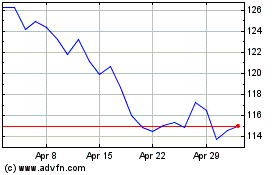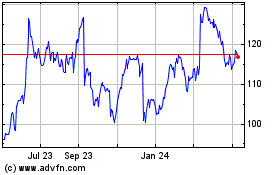Oracle Advances In Cloud Business -- WSJ
December 18 2018 - 3:02AM
Dow Jones News
By Maria Armental
This article is being republished as part of our daily
reproduction of WSJ.com articles that also appeared in the U.S.
print edition of The Wall Street Journal (December 18, 2018).
Oracle Corp. reported flat revenue for its latest quarter, a
result better than what Wall Street had been expecting, as the
software giant made progress in a piece of its struggling cloud
business.
Analysts have been looking for signs of whether Oracle could
energize its cloud-computing business after revenue growth stalled
in the first quarter and Thomas Kurian, the top cloud-computing
executive, left for rival Alphabet Inc.'s Google.
Revenue in Oracle's largest segment -- its cloud services and
license support -- rose to a stronger-than-projected $6.64 billion
in the quarter ended Nov. 30. Overall, Oracle generated $9.56
billion revenue, compared with $9.59 billion a year earlier.
Oracle changed how it reports its quarterly financial results
this year, mixing its cloud-computing business, which had been
growing more slowly than that of competitors, with its
licensing-support business. The change makes it harder to track
performance of the cloud business.
Shares, which closed Monday down 2% at $45.73, rose 6% to $48.55
in post-market trading, though company officials gave a tepid
financial forecast for the current quarter.
The software giant expects revenue in the third quarter to
increase 2% to 4%, excluding currency fluctuations. That would
translate to another quarter of, at best, flat revenue when
factoring in Oracle's projected 4% impact from currency
conversion.
Oracle officials sought to reassure investors about the cloud
business during a Monday conference call with analysts,
highlighting strong software-as-a-service bookings in the latest
period and Oracle's competitive edge from its autonomous
database.
"We need more than just a great database," said Larry Ellison,
the company's co-founder, chairman and chief technology officer.
"We also need first-class infrastructure to run the database on,
and we know finally have that."
Overall, Oracle reported second-quarter profit rose 5% to $2.33
billion, or 61 cents a share. Excluding stock-based compensation
and other items, profit rose to 80 cents a share from 69 cents a
share.
Analysts surveyed by FactSet expected an adjusted profit of 78
cents a share on $9.52 billion in revenue.
Oracle made its business selling software that companies run in
their own databases, but has spent years trying to find its footing
in the fast-growing cloud, where companies are increasingly renting
computing power and storage.
To catch up with the likes of Amazon.com Inc., Microsoft Corp.
and Google, Oracle pledged to quadruple the number of its giant
data-center complexes over a two-year period.
The Redwood City, Calif., company has used its cash pile to
raise stock buybacks, which has helped offset the pressure of
disappointing financial results. Oracle has spent $19.92 billion to
buy back stock for the first half of the year, including about $10
billion on 203 million shares in the quarter that ended in
November.
Write to Maria Armental at maria.armental@wsj.com
(END) Dow Jones Newswires
December 18, 2018 02:47 ET (07:47 GMT)
Copyright (c) 2018 Dow Jones & Company, Inc.
Oracle (NYSE:ORCL)
Historical Stock Chart
From Aug 2024 to Sep 2024

Oracle (NYSE:ORCL)
Historical Stock Chart
From Sep 2023 to Sep 2024
